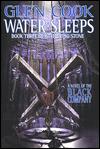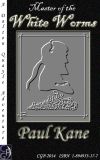
Ariel, by Steven R. Boyett
Book Review by Joshua Palmatier
Have you read this book?
Ariel originally came out in 1983, but was re-released in 2009 because Steven R. Boyett wrote a sequel to it called Elegy Beach. I wasn't aware of it until the re-release, which is a surprise because I like post-apocalyptic novels, and one that has fantasy overtones would have caught my attention. I can only assume that it just didn't cross my path in all of those years. In any case, I bought this immediately after seeing it.
The basic premise is that something caused a Change in the world, altering the laws of nature (physics) and suddenly electricity and guns don't work and the creatures of fantasy and myth begin roaming the lands. Pete is a survivor of the initial Change, and five years after that fateful day, he runs across a wounded unicorn he names Ariel. The two become Familiars, bonded to each other, and learn to survive in the post-apocalyptic world together. But a necromancer wielding power in New York has discovered the unicorn and wants the power of its horn for himself, and so the hunt is on.
I thought the book was good, but not stunning. Part of the problem was that there have been other books out since its initial release that have similar ideas and plots. If I'd read this when it was originally released, it likely would have come across as incredibly original and I'd have loved it. As is, it probably suffers a little from the time displacement. That doesn't mean it wasn't fun. I enjoyed the main character, and once the plot got going, I enjoyed the action. It was certainly an entertaining read, and I haven't read anything that has dealt with a post-apocalyptic fantasy is quite this way. But some of the post-apocalyptic tropes are here, such as the run-in with cannibals, etc. Once the main plot dealing with the necromancer in New York begins, though, it settles down into its own story and isn't about the world as it is after the Change and is more about the characters. And that's where it gets good (and is worth reading).
My main problems with it are with the slow start and with a little bit of the world itself. The book doesn't really begin until Pete and Ariel travel to Atlanta, but there's a long section of the book dealing with them wandering from Florida up to Atlanta. Some of this is how Pete meets Ariel and is establishing how they come to terms with each other, but all of that could have been worked in as back-story once the main plot started. The world building issues could also have been fixed easily. My main question is what happened to all of the people? The Change itself didn't kill anyone. Things just... stopped working, leaving everyone alive, and magical creatures started to appear. So... why are there so few people left now? There's no real explanation for how everyone ended up dying. I assume starvation, rioting, the usual, but there's no real mention of this. And if that were the case, there still seems to be plenty of undamaged property and resources left lying around. Now, some questions being left unanswered are fine (such as what exactly caused the Change in the first place), but some things needed to be fleshed out a little more, in my opinion. I didn't quite believe the world set-up as it was presented, but it could have been solved relatively easily with a few simple explanations. (For example, it could have been established that the Change made some people simply vanish, as if they'd flickered out of existence, or whatever.)
The ending also felt rushed. I thought it could have been developed more, which would have made what happens in the end more emotionally dramatic (and traumatic). I pretty much figured out how the book was going to end long before I got there, so it wasn't a surprise, but it still could have had more power than it did.
Now, the author does bring up the issue with the slow start and the rushed ending in his afterword to the novel, admitting that he agrees with those critiques. But this was how it was originally written, with only minor changes (and a few additions of originally cut scenes). He could have changed it, but I agree with him that if he had, it would have been a completely different book, and that wasn't the intent. He's grown as a writer since this was first published, and I certainly feel that I've grown as a writer since my first book hit the shelf. I know there are issues with that first novel (and all those that come afterwards), things that I would never do if I wrote the novel now, but as the author say in the afterword, that's who he was then and I agree that readers just have to accept that and take it for what it is.
So, overall, a good book. I'll definitely be reading the sequel (which is set 30 years after the Change), but it's not something I feel the need to pick up and read immediately. It doesn't involve the same characters, only the same world, so the urgency to "find out what's happened" isn't there. But I'll definitely check back on this world eventually.
Joshua Palmatier/Benjamin Tate
www.joshuapalmatier.com
www.benjamintate.com
The basic premise is that something caused a Change in the world, altering the laws of nature (physics) and suddenly electricity and guns don't work and the creatures of fantasy and myth begin roaming the lands. Pete is a survivor of the initial Change, and five years after that fateful day, he runs across a wounded unicorn he names Ariel. The two become Familiars, bonded to each other, and learn to survive in the post-apocalyptic world together. But a necromancer wielding power in New York has discovered the unicorn and wants the power of its horn for himself, and so the hunt is on.
I thought the book was good, but not stunning. Part of the problem was that there have been other books out since its initial release that have similar ideas and plots. If I'd read this when it was originally released, it likely would have come across as incredibly original and I'd have loved it. As is, it probably suffers a little from the time displacement. That doesn't mean it wasn't fun. I enjoyed the main character, and once the plot got going, I enjoyed the action. It was certainly an entertaining read, and I haven't read anything that has dealt with a post-apocalyptic fantasy is quite this way. But some of the post-apocalyptic tropes are here, such as the run-in with cannibals, etc. Once the main plot dealing with the necromancer in New York begins, though, it settles down into its own story and isn't about the world as it is after the Change and is more about the characters. And that's where it gets good (and is worth reading).
My main problems with it are with the slow start and with a little bit of the world itself. The book doesn't really begin until Pete and Ariel travel to Atlanta, but there's a long section of the book dealing with them wandering from Florida up to Atlanta. Some of this is how Pete meets Ariel and is establishing how they come to terms with each other, but all of that could have been worked in as back-story once the main plot started. The world building issues could also have been fixed easily. My main question is what happened to all of the people? The Change itself didn't kill anyone. Things just... stopped working, leaving everyone alive, and magical creatures started to appear. So... why are there so few people left now? There's no real explanation for how everyone ended up dying. I assume starvation, rioting, the usual, but there's no real mention of this. And if that were the case, there still seems to be plenty of undamaged property and resources left lying around. Now, some questions being left unanswered are fine (such as what exactly caused the Change in the first place), but some things needed to be fleshed out a little more, in my opinion. I didn't quite believe the world set-up as it was presented, but it could have been solved relatively easily with a few simple explanations. (For example, it could have been established that the Change made some people simply vanish, as if they'd flickered out of existence, or whatever.)
The ending also felt rushed. I thought it could have been developed more, which would have made what happens in the end more emotionally dramatic (and traumatic). I pretty much figured out how the book was going to end long before I got there, so it wasn't a surprise, but it still could have had more power than it did.
Now, the author does bring up the issue with the slow start and the rushed ending in his afterword to the novel, admitting that he agrees with those critiques. But this was how it was originally written, with only minor changes (and a few additions of originally cut scenes). He could have changed it, but I agree with him that if he had, it would have been a completely different book, and that wasn't the intent. He's grown as a writer since this was first published, and I certainly feel that I've grown as a writer since my first book hit the shelf. I know there are issues with that first novel (and all those that come afterwards), things that I would never do if I wrote the novel now, but as the author say in the afterword, that's who he was then and I agree that readers just have to accept that and take it for what it is.
So, overall, a good book. I'll definitely be reading the sequel (which is set 30 years after the Change), but it's not something I feel the need to pick up and read immediately. It doesn't involve the same characters, only the same world, so the urgency to "find out what's happened" isn't there. But I'll definitely check back on this world eventually.
Joshua Palmatier/Benjamin Tate
www.joshuapalmatier.com
www.benjamintate.com
|
Click here to buy Ariel, by Steven R. Boyett on Amazon
|
Ariel, by Steven R. Boyett on Amazon

| More Books You Might Like |
Comment on Ariel, by Steven R. Boyett



